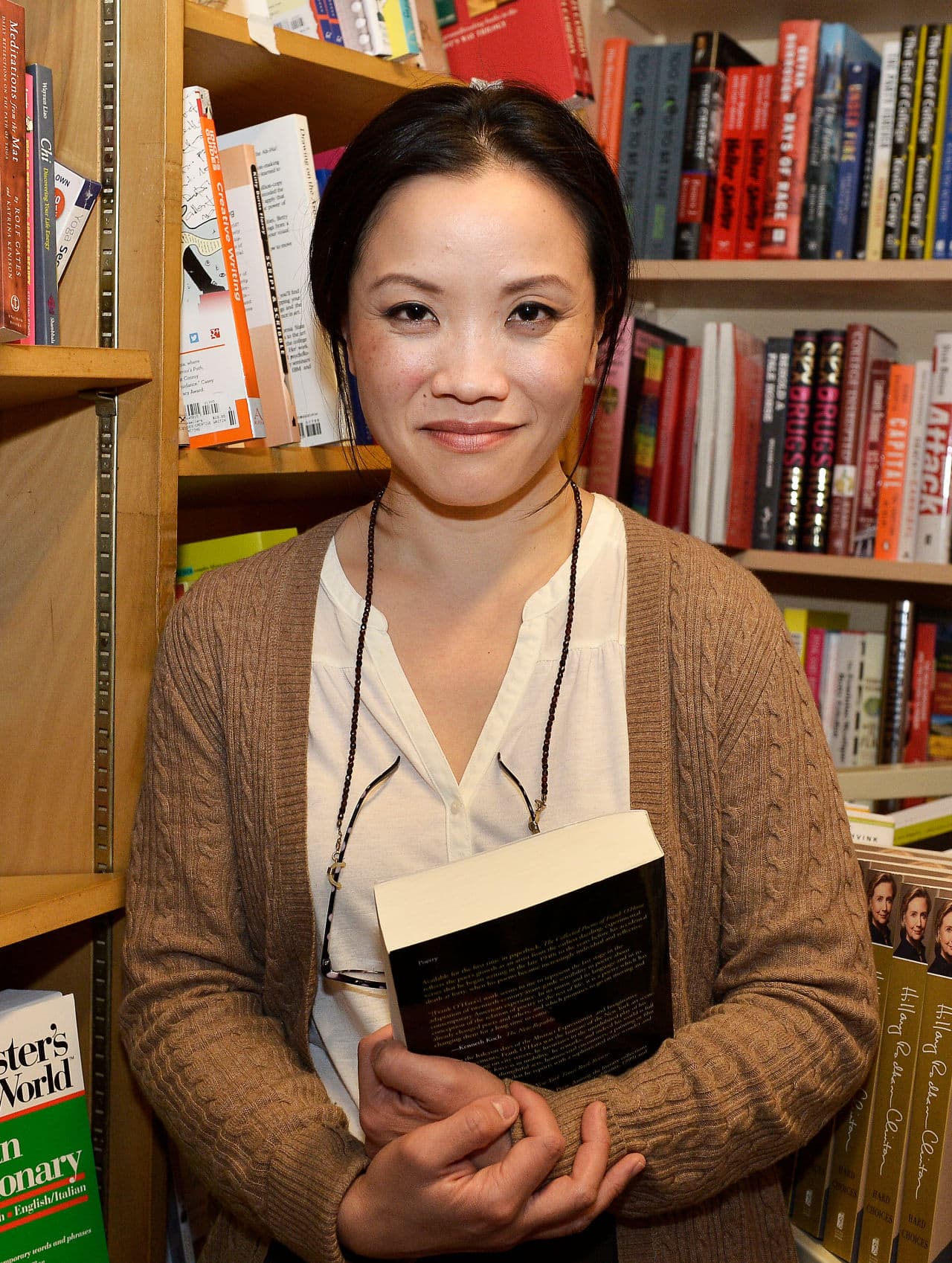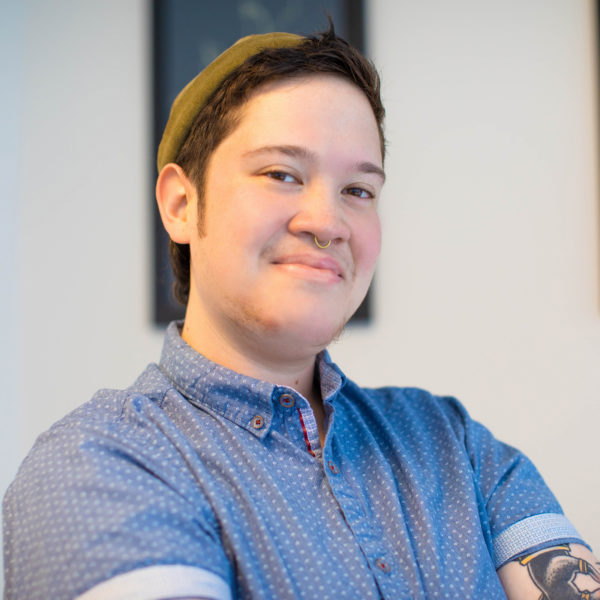Advertisement
The Huntington And Company One Bring Pamatmat To Boston

“I guess all I can say that covers everything I write is that I take a lot of time to build complete worlds that are as fun as they are frightening, and that can be as joyful as they are heart-breaking. Please just settle in, open yourself up to those worlds, and find a place for yourself in them.”
So says A. Rey Pamatmat, playwright and prominent emerging voice in the American theater scene. This spring, two of Boston’s theater companies — the Huntington Theatre Company and Company One — will co-host a double bill of Pamatmat’s work. It may be surprising to learn that such an occasion was far from planned. In fact, its origins were, as so many great things are, the result of a happy accident.

The Huntington and Company One had each been planning to produce Pamatmat’s “after all the terrible things I do” (through June 21) and “Edith Can Shoot Things and Hit Them,” (June 4-27) respectively, for their 2015 Spring seasons.
"We had been looking at this play for three years," says Shawn LaCount, artistic director at Company One, and director of "Edith Can Shoot Things And Hit Them." "['Edith' has] been a play that’s been close to my heart since we first read it, and we weren't sure how to get a buzz around it. A lot of what we do at the theater is find both community and cultural partners on everything we do. And so, with our friends over at the Huntington, when they were about to announce their Rey play, I read their description of it, and thought to myself, ‘Hmm.’”
Despite their vastly contrasting identities and existence on virtually opposite ends of the large- and small-theater spectrum, this isn’t the first time the two companies have embarked on such a relationship. In 2010, Speakeasy Stage Company, Company One and the Huntington produced complimentary runs of three works by Pulitzer Prize-winning playwright Annie Baker as part of a landmark theater marathon they dubbed, The Shirley, VT Plays Festival, after the fictional town of Baker’s creation. Company One was awarded four Elliot Norton Awards for their production of “The Aliens,” and Huntington received a nomination for Outstanding Production (Large Theater) for “Circle Mirror Transformation.”
With the ease and success of that first collaboration in mind, LaCount found that it was a simple thing to reach out to his friends at the Huntington again, and reports that they “didn’t hesitate” to partner up once more. Furthermore, LaCount felt that the two companies’ contrasting styles and target audiences would be beneficial for bringing exposure to Pamatmat’s work.
Advertisement
“The Huntington audience is not the Company One audience. We have an audience that’s 55 percent people under the age of 35 [at Company One], for instance. And so the idea of this work reaching more people, more broadly — traditional theatergoers, or non-traditional theatergoers, either way, Rey’s voice is an important one in the American theater,” LaCount says. “The fact that he hasn't been done in Boston yet is more embarrassing than it is anything else. So when we found a playwright like that, who needs to be amplified, what better way to do it than from both entry points — our audience, and their audience? This is valuable.”
According to LaCount, the arrival of Pamatmat’s work in Boston is a much-needed addition to the city’s theater scene, which can be a tough environment for Asian-American artists to find work. He describes this type of exclusion as “the a-- backwards nature of the industry we work in, which is really problematic, and really deep, and really old. It’s a patriarchal and also racist institution.”

“A lot of times, as a person of color, we don't get very interesting roles. They’re very, very minor,” says Tina Chilip, who portrays the female lead, Linda, in Huntington’s “after all the terrible things I do.” “For example, Nurse #6, or the Filipino nanny. You get tired of being backed into [a role] that doesn't go very deep. So to have something that’s super rich — it’s exciting, and it’s a challenge. It’s a huge challenge. And it’s scary. But that’s why you do it.”
She isn’t alone in her experiences.
“In all the plays that I read, there was something — the language was great, but something just didn't quite fit. I wondered, is there something intangible, something between the lines that reflects my experience somehow? And how much have I cleaned up my dialect, how much do I change to fit in?” says Gideon Bautista, who appears in “Edith Can Shoot Things and Hit Them” as Edith’s older brother, Kenny. “And then getting to do this, this is just like, ‘Oh, this what I’ve been really longing to do.'”
For Pamatmat, providing space for Asian-American artists like Bautista is a vital aspect of his work.
“If the American theater wants to remain relevant to the American people, then showcasing the work of artists of color isn't a commitment: It's accepting reality,” Pamatmat himself says, in regard to what his experiences have been like as a playwright. “One thing I will say is that finding a community of like-minded artists is the surest way to build a fulfilling life in the theater. Not just to support your work, but because if you support the work of other artists of color, women artists, queer artists and so on, you can change the entire landscape of the American theater so that it looks more like the actual United States of America.”
Pamatmat’s statement on the changing landscape of American experience mirrors LaCount’s commitment to bringing “Edith” to Boston audiences.
“I think of Rey as a next-generation playwright, because [“Edith”] is an American story. What I love about Rey is how he's able to make the simple and the complicated link beautifully,” LaCount says. “It’s the simple story of the people we know, and their complicated lives. That, for me, is what makes the Great American Play. What Rey is doing, he’s doing it for our generation.”
At their cores, Pamatmat’s plays center on regular people. The issues he writes about are real — for “Edith,” it’s the quintessential adolescent journey of defining family, first love and sexual identity; in “all the terrible things I do,” the focus is turned to the ripple effects of abuse, and the possibility of forgiveness and redemption. Though the narratives of his characters may be unfamiliar due to cultural and racial barriers, the struggles and triumphs his young people face are universal.
“[Rey tells] a story about family and isolation through the lens of the Filipino-American experience. Before Rey’s play, I’d never read that before. That was really special, you know, coming from my cultural background. But it was also a coming of age story that was so heartbreaking, but also so sweet. I felt like you knew these people. These could be your next door neighbors,” says Maria Jan Carreon, who plays the titular protagonist in “Edith.”

“They’re real people. Whatever if they’re Filipino, whatever if they're gay. These are real stories. I challenge someone to find something that they don't connect with,” echoes Eddie Shields, also appearing in “Edith” as Kenny’s love interest Benji.
While certainly celebratory, this event signifies more than uplifting the work of a worthy artist — for LaCount, it also indicates an important step forward for Boston’s theater scene, and he believes that the plays’ messages of inclusivity will resonate with audiences.
“I’m hoping that there’s a new awareness of a new kind of theater, a new playwright, a new story being told. I’m hoping that there’s a broader awareness about a really exciting small theater company that’s been in town for a while. I’m hoping that there’s a celebration of the actors who are relatively new the scene, each of them different in their experiences,” LaCount says. “For me, there are a thousand entry points here. And I hope that you leave uplifted and touched and hopeful — and thoroughly entertained.”
Spencer Icasiano was an arts editor at DigBoston. Now she freelances.
